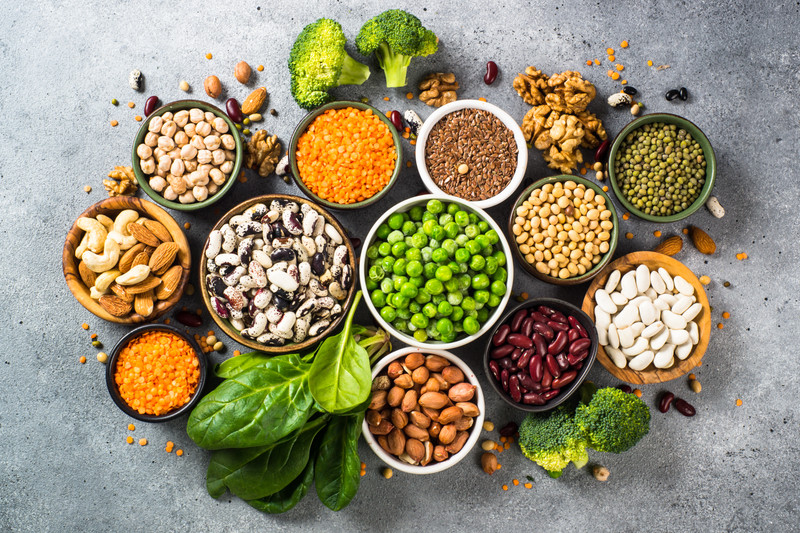Protein is an essential macronutrient that supports muscle growth, tissue repair, hormone production, and overall health. While animal products like meat, eggs, and dairy are commonly known for their high protein content, many plant-based foods also offer an abundance of protein. For vegetarians, vegans, or anyone looking to incorporate more plant-based options into their diet, understanding the best sources of plant-based protein is key to maintaining a balanced and nutritious diet.
Why Is Protein Important?
Protein is made up of amino acids, which are the building blocks of the body. While some amino acids can be produced by the body, others, known as essential amino acids, must be obtained through diet. Protein plays a crucial role in:
- Building and repairing tissues: Especially muscles, skin, and organs.
- Producing enzymes and hormones: Regulating metabolic processes.
- Maintaining satiety: Helping you feel fuller for longer and supporting weight management.
Plant-based protein sources can provide all or most of these essential amino acids, especially when combined strategically to form complete proteins.
Best Plant-Based Sources of Protein
Legumes
Legumes are a powerhouse of plant-based protein and essential nutrients. Lentils provide about 18 grams of protein per cooked cup and are rich in fiber, folate, and iron. Chickpeas (garbanzo beans) offer around 15 grams of protein per cooked cup and are versatile for salads, soups, and hummus. Black beans, which contain 15 grams of protein per cooked cup, are another excellent option for tacos, stews, and grain bowls. These nutrient-dense foods also support digestion and promote fullness, making them a staple for plant-based diets.
Tofu, Tempeh, and Edamame
Tofu, tempeh, and edamame are soy-based products that offer some of the highest amounts of protein in plant-based diets. Tofu provides about 21.8 grams of protein per half-cup serving and absorbs flavors well, making it incredibly versatile. Tempeh, a fermented soy product, contains about 15 grams of protein per half-cup and offers a nutty flavor ideal for stir-fries and sandwiches. Edamame, or young soybeans, delivers 17 grams of protein per cooked cup, making it a satisfying snack or salad topping. As complete proteins, soy-based foods contain all nine essential amino acids.
Quinoa
Quinoa is a gluten-free pseudocereal that provides 8 grams of protein per cooked cup. Unlike most grains, quinoa is a complete protein, containing all essential amino acids. It is also rich in fiber, iron, magnesium, and manganese, making it an excellent addition to a nutrient-rich diet. Quinoa can easily replace rice or pasta and serves as a great base for salads and grain bowls, offering versatility and nutritional value in one dish.
Nuts and Seeds
Nuts and seeds are protein-rich foods that also provide healthy fats, vitamins, and minerals. Almonds contain 6 grams of protein per ounce, while peanuts provide 7 grams per ounce. Pumpkin seeds are particularly high in protein, offering 7 grams per ounce along with zinc and magnesium. Chia seeds provide 5 grams per ounce and are high in omega-3 fatty acids, while hemp seeds deliver 10 grams per ounce as a complete protein. These can be used as snacks, salad toppings, or blended into smoothies for a protein boost.
Grains
Whole grains provide both carbohydrates and protein, making them an excellent energy source. Oats offer 6 grams of protein per cooked cup and are rich in soluble fiber. Farro contains 12 grams of protein per cooked cup and adds a hearty texture to soups and salads. Brown rice provides 5 grams of protein per cooked cup and pairs well with beans to form a complete protein. These grains also deliver essential vitamins, minerals, and fiber to support overall health.
Plant-Based Protein Powders
For those needing a quick and concentrated protein source, plant-based protein powders are a convenient solution. Pea protein, derived from yellow peas, is rich in all essential amino acids. Hemp protein contains omega-3 fatty acids and fiber, while brown rice protein is easily digestible and hypoallergenic. These powders can be blended into smoothies, added to baked goods, or stirred into oatmeal for an effortless protein boost.
Vegetables
Certain vegetables are surprisingly high in protein and offer a variety of essential nutrients. Spinach contains 5 grams of protein per cooked cup and is also high in iron and vitamins. Broccoli provides 4 grams of protein per cooked cup and is an excellent source of vitamin C and fiber. Brussels sprouts, with 4 grams of protein per cooked cup, are another nutrient-packed option. Incorporating these vegetables into meals enhances both protein intake and overall nutrition.
Tips for Maximizing Protein Intake on a Plant-Based Diet
- Combine Foods for Complete Proteins: Pair incomplete proteins like rice and beans to ensure you get all essential amino acids.
- Prioritize Protein at Every Meal: Include a protein-rich food in each meal to meet your daily requirements.
- Snack Smart: Keep protein-packed snacks like nuts, seeds, or roasted chickpeas on hand for between-meal energy.
- Experiment with Recipes: Incorporate plant-based proteins into familiar dishes, like swapping meat for lentils in tacos or tofu in stir-fries.
- Monitor Your Intake: Ensure you’re getting enough protein to meet your activity level and overall health goals.
A Note from Us
Plant-based protein sources are not only nutritious but also sustainable and versatile, making them a great choice for anyone looking to diversify their diet. Whether you’re a dedicated vegan or simply exploring more plant-based options, foods like legumes, tofu, nuts, seeds, and grains can provide the protein you need to thrive.

